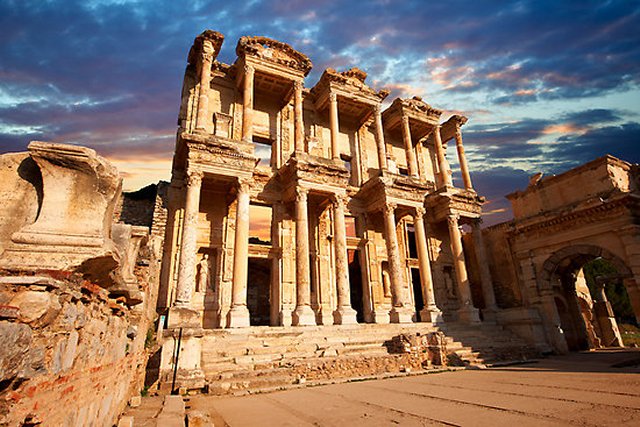MessageToEagle.com – This library is one of the most beautiful structures in Ephesus, Turkey.
It was built in 117 A.D. as a monumental tomb for Gaius Julius Celsus Polemaeanus, the governor of the province of Asia; from his son Galius Julius Aquila.
The grave of Celsus was beneath the ground floor, across the entrance and there was a statue of Athena, the goddess of the wisdom. There were nine steps leading to the entrance of the library which consisted of three large doors. Large windows had been constructed above the doors and the second floor in order to let light enter the library.
The scrolls of the manuscripts were kept in cupboards in niches on the walls. There were double walls behind the bookcases to prevent them from the extremes of temperature and humidity.
The capacity of the library was more than 12,000 scrolls. It was the third richest library in ancient times after the Alexandria and Pergamum.
The statues in the niches of the columns today are the copies of the originals.

The statues symbolize wisdom (Sophia), knowledge (Episteme), intelligence (Ennoia) and valor (Arete). These are the virtues of Celsus. The library was burnt during the 3rd century by the Goths who attacked Ephesus. Fortunately, a great part of its façade was not damaged seriously, so it has survived nowadays in a pretty good condition.
See also:
10 Magnificent Ancient Libraries
Hulagu Khan Destroyed Thousands Of Priceless Ancient Books Kept In The House Of Wisdom In Baghdad
Herculaneum Time Capsule: Ancient Scrolls With Secrets Buried Under Volcanic Ash And Stones
The library was restored with the aid of the Austrian Archaeological Institute and the originals of the statues were taken to Ephesus Museum in Vienna in 1910.
There was an auditorium that was used for lectures or presentations between the library and the Marble Road. It was built during the reign of the Emperor Hadrian.
MessageToEagle.com







